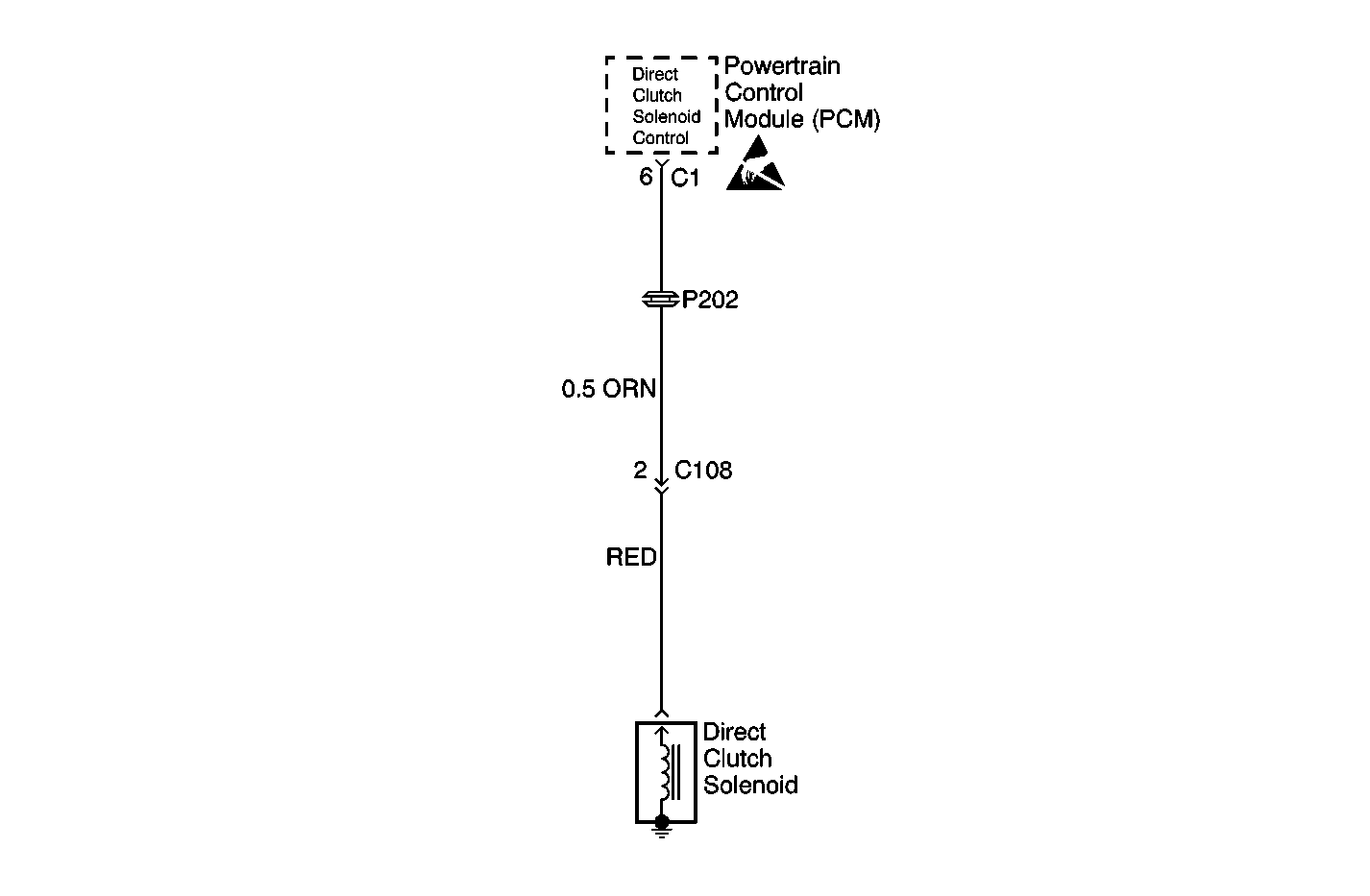
Circuit Description
The shift solenoid #1 is energized and de-energized by the Powertrain Control Module (PCM) in response to varying transaxle shift demands. With the Direct Clutch Solenoid de-energized, line pressure is applied to the 2-3 shift valve. With the line pressure applied, the 2-3 shift operates, and the transaxle shifts from second to third gear. When the PCM energizes the Direct Clutch Solenoid, line pressure is relieved, and the 2-3 shift valve does not operate.
Conditions for Setting the DTC
DTC P0753 will set when the following conditions are met:
| • | The PCM does not experience any voltage drop across the Direct Clutch Solenoid control circuit during the attempted solenoid energization. |
| • | One driving cycle detection logic. |
Action Taken When the DTC Sets
A DTC P0753 is stored and the Malfunction Indicator Lamp (MIL) is turned ON.
Diagnostic Aids
Check for the following conditions:
| • | An open or shorted Direct Clutch Solenoid |
| • | Faulty electrical circuits (open or short to the ground) between the shift solenoid #1 and the PCM |
| • | A faulty PCM |
An intermittent may be caused by the following conditions:
| • | A poor connection |
| • | Rubbed through wire insulation |
| • | A broken wire inside the insulation |
Inspect the PCM harness connectors for the following conditions:
| • | Backed out terminals |
| • | Improper mating |
| • | Broken locks |
| • | Improperly formed or damaged terminals |
| • | Poor terminal-to-wire connections |
Perform the following steps if DTC P0753 cannot be duplicated:
- Read the information in the freeze frame data.
- Use the data to determine the vehicle operating conditions when the DTC was set.
Inspect the wiring. If any wiring repairs are necessary, refer to Wiring Repairs in Wiring Repair.
DTC Confirmation Procedure
- Turn the ignition switch to LOCK.
- Connect the scan tool to Data Link Connector (DLC).
- Turn the ignition switch to ON.
- Use a scan tool to clear the following items from the PCM memory:
- Start the engine.
- Step firmly on the brake pedal.
- Shift the manual selector to Drive (D).
- Leave the selector in Drive (D) for 10 seconds.
- Accelerate the vehicle in Drive (D).
- Keep driving for 10 seconds at 40 km/h (25 mph).
- Stop the vehicle.
- Use the scan tool to inspect for DTC P0753
| • | The DTC |
| • | The pending DTC |
| • | Freeze frame data |
Test Description
The number(s) below refer to the step number(s) on the diagnostic table.
-
The Powertrain OBD System Check prompts the technician to complete some basic checks and store the freeze frame data on the scan tool is applicable. This creates an electronic copy of the data taken when the fault occurred. The information is then stored in the scan tool for later reference.
-
This step inspects the internal coil resistance of the direct clutch solenoid.
-
This step inspects for a short to ground in the direct clutch solenoid control circuit.
-
This step inspects for an open in the direct clutch solenoid control circuit.
-
This step inspects the transaxle internal electrical harness for damage.
-
This step inspects for a short to voltage in the direct clutch solenoid control circuit.
-
This step inspects for a poor electrical connection that may have caused DTC to set.
-
This step inspects for a faulty PCM.
Step | Action | Value(s) | Yes | No |
|---|---|---|---|---|
Was the On-Board Diagnostic (OBD) System Check performed? | -- | Refer to OBD System Check in Electrical Controls | ||
2 |
Does the scan tool display any other DTCs in addition to DTC P0753? | -- | Refer to the applicable DTC table. | |
Is the resistance within the specified range? | 8-20 ohms at 24°C (75°F) | |||
Is the resistance equal to the specified value? | ∞ | |||
Use the J 39200 Is the resistance less than the specified value? | 2 ohms | -- | ||
Is the action complete? | -- | -- | ||
Is the voltage less than the specified value? | 2V | |||
Inspect all of the electrical connections for a poor terminal contact or a poor connection. Is a poor terminal contact or a poor connection present? | -- | |||
Does DTC P0753 reset? | -- | |||
10 | Repair the short to ground in ORN wire between the PCM and the direct clutch solenoid. Is the repair complete? | -- | -- | |
11 | Repair open or high resistance in the RED wire or in the ORN wire between PCM and the direct clutch solenoid. Is the repair complete? | -- | -- | |
12 | Repair the short to voltage in the RED wire or in the ORN wire between the PCM and the direct clutch solenoid. Is the repair complete? | -- | -- | |
13 | Repair the terminals or connections that exhibit poor contact. Is the repair complete? | -- | ||
14 | Refer to Diagnostic Aids for a possible intermittent condition. If the condition is not intermittent, replace the Powertrain Control Module (PCM). Refer to PCM Replacement in Engine Controls. Is the action complete? | -- | -- | |
15 | Refer to Diagnostic Aids for additional information about DTC P0753. Is the action complete? | -- | -- | |
16 | Perform the DTC Confirmation Procedure. Are any DTCs displayed on the Scan Tool? | -- | Refer to the applicable DTC table | System OK |
